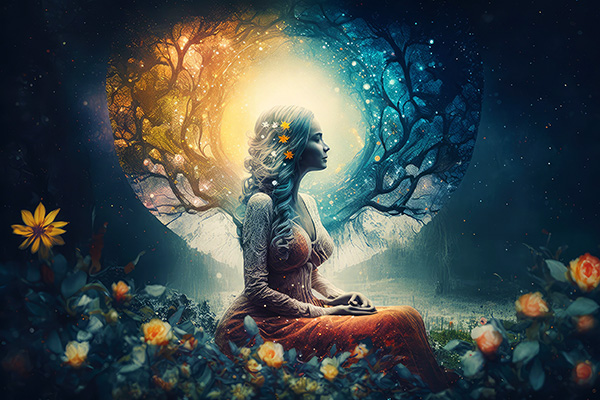healthy living
Tarot Forecast January 2025: Two Of Swords
 This month the energy of the Two of Swords takes center stage. It is a card of indecision, stalemate, reflection, and difficult choices, potentially predicting that we may face uncertainty, difficult decisions and the need for introspection as we move into the New Year.
This month the energy of the Two of Swords takes center stage. It is a card of indecision, stalemate, reflection, and difficult choices, potentially predicting that we may face uncertainty, difficult decisions and the need for introspection as we move into the New Year.
The Two of Swords represents moments in life when we find ourselves at a crossroads, weighing options and feeling the need to pause before making an important decision. It often comes up in readings when there is a stalemate or dead-end situation where no progress can be made until a decision is made or some action is taken.
The Two of Swords depicts a blindfolded figure sitting by a still body of water holding two crossed swords. The blindfold symbolizes the inability or unwillingness to see the whole picture or face a choice. The crossed swords signify inner conflict or conflicting choices, while the water in the background suggests the emotional undercurrents influencing the situation.
Traditionally, the Moon also appears in the card, representing uncertainty, mystery, and the unknown. Together, these symbols paint a picture of introspection, duality, and the need to find clarity and balance.
The card signifies the need to balance opposing forces or ideas. It emphasizes the importance of finding balance in a challenging situation. It can also represent emotional turmoil or an inability to reconcile conflicting aspects of a situation.
The Two of Swords encourages us to seek clarity, face challenges head-on, and strive for balance in our choices and decisions. It reminds us that avoiding a problem won’t make it go away; instead, it’s important to face it with a clear mind and an open heart.
Spiritual Self-Care For The Sensitive Soul
 For those of us who are highly sensitive, including psychics, mediums, healers, and empaths, practicing consistent spiritual self-care is essential to maintaining our overall well-being.
For those of us who are highly sensitive, including psychics, mediums, healers, and empaths, practicing consistent spiritual self-care is essential to maintaining our overall well-being.
If you identify with this group and neglect the daily maintenance of your energetic health and spiritual hygiene, you leave yourself vulnerable. This can manifest as emotional, mental, and even physical health problems. The good news? You can safeguard your well-being with a dedicated spiritual self-care routine.
Spiritual self-care is about nurturing your inner being and maintaining healthy energy flow and balance. It includes practices that support your spiritual well-being and ensure that you stay grounded, centered, and connected to your higher self and the universe.
Regular spiritual self-care is also a matter of health. Research strongly supports the positive effects of spirituality on our overall health. Studies show that spiritually active people tend to live longer and enjoy better mental and physical health. For example, spirituality has been shown to correlate with a reduced risk of Alzheimer’s disease and cognitive decline.
Spirituality is associated with better mental health, including lower levels of depression and anxiety. Studies show that spiritual activities promote positive emotions such as hope, forgiveness, and gratitude, which contribute to resilience to stress and emotional challenges. It also promotes healthier lifestyles, including reduced substance use and better stress management.
Tarot Forecast December 2024: The Sun
 This month the radiant Sun card shines brightly, promising clarity, joy, and renewed purpose. Its energy invites us to embrace growth, positivity, and authenticity, and encourages us to step into our power with confidence.
This month the radiant Sun card shines brightly, promising clarity, joy, and renewed purpose. Its energy invites us to embrace growth, positivity, and authenticity, and encourages us to step into our power with confidence.
As the Sun illuminates every corner of your life, it brings the promise of new beginnings, breakthroughs, and upliftment in the coming month. This is a time to trust in your journey, to keep your heart open, and to embrace all that the universe has to offer.
The Sun card is a powerful symbol of positivity, joy and abundance. It represents the culmination of a journey, the achievement of goals, and the realization of dreams.
The card traditionally depicts a radiant sun shining brightly, illuminating a happy child playing freely in a field. This imagery conveys themes of innocence, vitality, and pure happiness.
The sun itself is a universal symbol of life, warmth and energy. It represents awareness, clarity and understanding. The child in the card symbolizes the pure and innocent spirit within each of us, reminding us to embrace our inner child and find joy in simple things. The field represents the material world, and the child’s playful nature suggests that we can find fulfillment and happiness in the physical realm.
The Sun card is generally interpreted as a sign of hope, encouragement, and success. It suggests that a time of joy, happiness, and fulfillment is on the horizon. The challenges and obstacles of the past have been overcome, and now it is time to bask in the warmth of the sun’s rays. The card encourages us to embrace our true selves, radiate our positive energy, and share our light with others.
Cultivating A Thriving Garden Of The Mind
 Your mind is like a fertile garden, constantly nurturing and cultivating the seeds of thought you plant each day. Every waking moment your ideas, beliefs, and perceptions take hold and gradually grow into the mental landscape that ultimately shapes your reality.
Your mind is like a fertile garden, constantly nurturing and cultivating the seeds of thought you plant each day. Every waking moment your ideas, beliefs, and perceptions take hold and gradually grow into the mental landscape that ultimately shapes your reality.
If you could take a walk through your “mind garden,” what would you find? Would you see sturdy, thriving trees of faith, hope, and positivity, their roots deeply nourishing the soil of your thoughts? Perhaps vibrant, radiant flowers of joy, abundance and well-being brightening the landscape?
Or would you find brittle branches of lost dreams and dry, withered remnants of unfulfilled hopes? Perhaps the creeping weeds of negativity and doubt smothering your true potential, casting shadows over your hopes and ideals?
I actually do this visualization sometimes as part of my morning meditation practice. I imagine walking through my inner garden, tending to my thoughts and beliefs, nurturing them with faith and positivity, fertilizing those that are flourishing, and pulling out the weeds of doubt, fear, or negativity that had somehow taken root and are no longer serving my highest good.
I also ask for divine guidance, calling on God, my guides and loved ones in spirit to help me recognize innate talents and growth opportunities that I might have overlooked or neglected. Perhaps there are hidden seeds within me that still need to be planted or nurtured. With intention, I also visualize planting new seeds of goodness, self-empowerment, and spiritual expansion.
The Common Cold As A Spiritual Detox
 It is quite common for people going through a period of spiritual growth or awakening to experience physical symptoms and illnesses such as colds, flu, or other infections.
It is quite common for people going through a period of spiritual growth or awakening to experience physical symptoms and illnesses such as colds, flu, or other infections.
Experiencing a nasty cold during your spiritual awakening is not only annoying, but also seems out of place and counterintuitive, especially when you’re supposed to be focusing on expanding your awareness, aligning your energy, and strengthening your connection to spirit and the divine.
However, it is important to know that the onset of physical symptoms, such as a cold or flu, usually has a profound spiritual significance. Although it may seem like an inconvenient interruption or a stroke of bad luck, this type of physical setback is often an essential part of our spiritual journey, as it is a sign that we are releasing old, toxic energies in order to heal and make room for new insights and energy.
I remember a pivotal moment in my own spiritual journey when I came down with a terrible cold. At the time, I was deeply immersed in exploring my Akashic Record and uncovering truths about certain past life traumas – particularly memories of being persecuted as a witch in a past life. This process brought up a flood of intense soul memories and ancient psychic wounds that had been waiting to be processed for several centuries!
One morning, after a particularly intense Akashic meditation the night before, I awoke with a scratchy throat, stuffy nose, body aches, and overwhelming fatigue. Frustrated, I wondered why I was getting sick now, just as I was breaking through to a deeper level of awareness and karmic healing. But as I surrendered to my body’s need for rest and recovery, I soon began to see the deeper purpose of my illness.
Not Everyone Chooses The Path Of Healing
 You’ve probably heard the phrase “what they don’t know can’t hurt them.” Sometimes this is true, but there are also times when what people choose to ignore or disregard can cause real harm – not only to themselves, but also to those around them.
You’ve probably heard the phrase “what they don’t know can’t hurt them.” Sometimes this is true, but there are also times when what people choose to ignore or disregard can cause real harm – not only to themselves, but also to those around them.
For those of us with psychic or spiritual gifts, there’s an added complexity: the ability to sense the struggles of others, which leads to the question of when and how to help.
Intuitives, channelers and healers are very aware of the energy of others, even when we’re just going about our daily routines. Whether it’s a stranger in the grocery store or a friend across the room, we tend to sense when someone is struggling with grief, trauma or stress.
We may choose to quietly send them comforting or healing energy, hoping it will ease their pain, even if only for a moment, yet the urge to help can be very strong in these situations. And while reaching out and offering help can be very uplifting or rewarding for everyone involved, there are times when our attempts to help are met with resistance, or worse, denial.
It’s especially challenging to see someone we care about turn a blind eye to their own needs or pain, and even more so when our support is disregarded or unappreciated.
One of the hardest lessons I have had to learn in both my personal and professional life is that I can only help those who are willing to help themselves. The sad truth is that sometimes people choose not to act on information that could improve their lives or change their destiny. Instead, their negativity, anger, or fear allows the problem to fester or the behavior to grow, affecting not only themselves but also their loved ones. Over time, this denial creates a cycle of suffering that affects physical, mental and karmic health and well-being, sometimes for generations.
Tarot Forecast November 2024: King Of Pentacles
 The card I drew for this month is the King of Pentacles, which predicts a time of stability, abundance, and grounded success. This card is associated with material wealth, financial security, and mastery of the physical realm. It signals that now is the time to use your practical wisdom and focus on tangible results.
The card I drew for this month is the King of Pentacles, which predicts a time of stability, abundance, and grounded success. This card is associated with material wealth, financial security, and mastery of the physical realm. It signals that now is the time to use your practical wisdom and focus on tangible results.
Whether we’re building a business, investing in a new opportunity, or seeking a stable foundation, the King of Pentacles reminds us that patience, diligence, and careful planning are the keys to long-term success.
The imagery of the King of Pentacles is rich in symbolism. Sitting on an elaborate throne decorated with carvings of bulls and vines, he is a figure of authority and strength closely associated with the earth element. The grapes and lush greenery surrounding him symbolize fertility, prosperity and the fruits of hard work.
In his hand he holds a golden pentacle coin, representing mastery over the material world and the ability to turn dreams into reality. His robes are embroidered with images of grapes and vines, further reinforcing the themes of abundance and material growth.
The king’s pragmatic energy of self-mastery suggests that this November will not be a time for reckless actions or impulsive decisions. Instead, it’s about making strategic moves with confidence and a long-term perspective.
The symbolism of this card also encourages embracing a provider role – whether in business, family or community – as the King of Pentacles is a generous benefactor and pragmatic leader who shares his wealth and success with others.